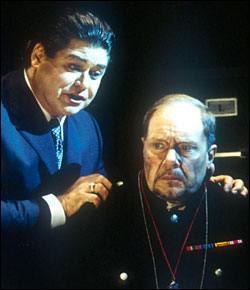Directors like to update Beethoven’s Fidelio to “relevant” settings, under the assumption that this 1814 tale of defeated political oppression will work when set in any time and place in which political oppression exists. Well, yes and no.
It was a bit anachronistic to have the Age of Enlightenment Don Fernando pop up in Seattle Opera’s new production (running through Saturday, May 17 at Mercer Arts Arena, 206-389-7676) amidst contemporary trappings courtesy of director Chris Alexander and set designer Robert Dahlstrom: barbed wire, surveillance video monitors, guards in riot gear, and a chain-link prison gate that characters open with key cards. (The prison’s looming gray facade first reminded me, unfortunately, of the similarly looming, equally gray sidewall of the new opera house fronting Mercer Street.) Fidelio‘s villain, Don Pizarro, is bested only by the timely arrival of Don Fernando, an even higheralbeit uncorruptauthority. The concept of the liberal, but still absolute, ruler was very much of Beethoven’s time and an operatic staple; the very idea of an opera advocating democracy would have been smothered in the cradle in Metternich’s Vienna.
The truly eternal value that Fidelio celebrates is the marital bond, and this production’s most moving moment is when waiting wives (in street clothesjust what the women’s chorus wore to rehearsal, from the looks of it) are reunited with their political-prisoner husbands. Here’s something else that hasn’t changed: Pizarro says he’s imprisoned his rival Florestan for reasons of, as the supertitles put it, “national security.”
“Fidelio” is the male identity that Florestan’s wife, Leonore, assumes when she takes a job at the prison to try to rescue him. Both Jane Eaglen and Richard Margison are singing Leonore and Florestan for the first time here, and both scored. In her early numbers, Eaglen occasionally clipped phrase endings, as if her breath control was giving out just an augenblick too soon, but she soon assumed her usual soaring vocal ease. Her powerful, gleaming soprano dominated only when it needed to; in the lovely Act I quartet, she balanced her lighter-voiced colleagues beautifully. Andwho knew?Eaglen has a flair for light comedy, which we haven’t seen (to say the least) in her other recent roles for Seattle Opera: Turandot, Isolde, and Brnnhilde.
Margison displayed an amazing range of vocal color and weight in just the first half-minute or so of his opening aria. His very first note, pale and enervated, was a shrewd bit of characterization he really did sound as if he’d been in a dungeon for two years. He took just one syllable to establish it, then unveiled his warm, clarion tenor.
As Pizarro, one of opera’s great mustache- twirlers, Richard Paul Fink was surprisingly subdued. He breathed fire as the half-mad Jokanaan in last season’s Salome, but his take on Pizarro was a sort of chilling, low-key suavityclever, though he didn’t quite put over the wild malevolence of his big revenge aria.
Similarly, I would have welcomed more punch from the orchestra here and there, though conductor Gerard Schwarz brought the hurtling finale to a splendid pitch of ecstasy. It’s one final hymn in praise of wifely devotion, driven home with an aching irony: a curtain tableau of a woman and two children left alone onstage, whose husband/father was nowhere to be found among the liberated prisoners. Even after evil is defeated, not all stories end happily.







